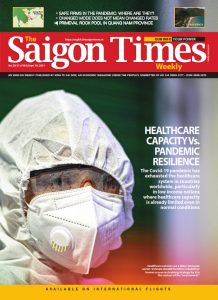Whatever the choice may be, either going one’s own way or cooperating with Tech Giants, what should be learned here is overestimation of new technologies which have been much touted, such as blockchain, should be circumvented. Nor should different agencies be allowed to develop their own apps, as none of which are perfect.
People in Vietnam are looking forward to a form of green vaccination card issued to those with two vaccine shots allowing them to move relatively freely and take part in economic activities. This card is believed to be the starting line on the long path to a normal society. “The green vaccination card” is expected to replace all other kinds of travel passes and turn the situation in which “people are restricted from going out by making use of checkpoints” into “building a safe circulation corridor” for people meeting certain conditions.
However, to make the most of the “green vaccination card,” it needs to solve a host of problems, the first of which is the smooth and workable issuance of digital vaccination certificates via a mobile phone app. Currently, many who have received vaccines have not been registered by the e-health book. Many others say their inoculation data are incorrect, from vaccination date and the vaccines in use to the right place where vaccines are administered. In the author’s opinion, information about people immunized at places managed by local authorities is updated much quicker and in a more accurate way than that of those receiving their jabs at hospitals. As there had been a large number of vaccinated people before the vaccination app was born, it is no surprise they have not been registered. And who will update the information concerned remains an open question.

Anyway, the problem of vaccination certification on the app or related errors or updates is not really tough. A much bigger conundrum, which may prolong indefinitely, relates to the fact that the e-health book fails to connect with the mainframe, and thus always gives warns of errors or asks users to input their updates of personal data. The author tried pressing on the icon “Covid vaccination certification” time and again. Out of the 10 presses, five or six times, circles appearing on the app kept him waiting. Then an announcement popped up, which said, “Please correctly enter your full name (with tonal symbols), date of birth. Then try again!” This is quite comprehensible because in the initial phase, when only several hundred thousand users linked to the app, it would run smoothly. However, now that millions of or even tens of millions of users utilize it, the mainframe may fail to function properly when a great number of users access it at a time. Therefore, even when the updating problem is solved, there won’t be a “green vaccination card” permanently present on the people’s mobile phones. Which is why users would react with shock and dismay when finding that the app suddenly says they have not been vaccinated although they already took the shot, say, a month ago.
Some would argue that users may access the app at home. After the app shows the QR code certifying that they have received one or two jabs, the QR code on the screen should be photographed to be used as the “green vaccination card.” However, at checkpoints, after the QR code has been swiped, officials at the checkpoints also need to connect to the mainframe to verify data. If the connection from users to the mainframe is on and off unpredictably as it is the case now, the storage of QR codes may not be useful because the connection to the mainframe at checkpoints may not feasible. Therefore, it is necessary to update the mainframe and the bandwidth if we want to put in use a workable “green vaccination card.”
Another option is to wait and work with Big Tech, such as Google or Apple, that have announced their integration of the “vaccine passport” in their operation systems for mobile phones. Take for example, Samsung. This company has made public its cooperation with Common Project, a developer of “vaccine passport” apps for mobile phones. For instance, the CommonHealth app would ask users for some personal data, such as full name, place and date of birth and place of vaccination. What Common Project will do next is to link to all vaccination management agencies in countries worldwide to access data and collate the information provided by users with the data. The app will rapidly provide a QR code with which users may utilize as their “vaccine passports.”
Google has updated its Passes API (Application Programming Interface) to allow healthcare bodies and vaccination institutions to have the right to access APIs and create vaccination certificates on Android mobile phones. Apple has also announced that when the iOS15 version is introduced soon this summer, the Health app, which is already present on its phones will be supplemented with the function of Covid-19 vaccination. Subsequently, instead of writing a separate app and investing hugely in a system of mainframes, it is possible to connect with Google and Apple to optimize the strength of Big-Tech to create vaccination certificates in an easy and checkable way.
Whatever the choice may be, either going one’s own way or cooperating with Tech Giants, what should be learnt here is overestimation of new technologies which have been much touted, such as blockchain, should be circumvented. Nor should different agencies be allowed to develop their own apps, as none of which are perfect. Please bear in mind that by nature, the “green vaccination card” is the certificate which is printable so that people can take it with them. The “green card” on the mobile phone is only one version of this certificate, which should therefore be simpler and easier to use. Otherwise, its intended purpose cannot be accomplished.
By Nguyen Vu









